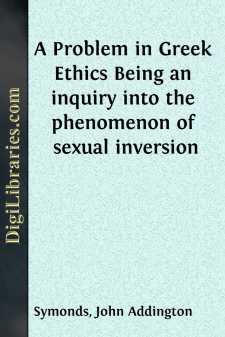Categories
- Antiques & Collectibles 13
- Architecture 36
- Art 48
- Bibles 22
- Biography & Autobiography 813
- Body, Mind & Spirit 142
- Business & Economics 28
- Children's Books 17
- Children's Fiction 14
- Computers 4
- Cooking 94
- Crafts & Hobbies 4
- Drama 346
- Education 46
- Family & Relationships 57
- Fiction 11829
- Games 19
- Gardening 17
- Health & Fitness 34
- History 1377
- House & Home 1
- Humor 147
- Juvenile Fiction 1873
- Juvenile Nonfiction 202
- Language Arts & Disciplines 88
- Law 16
- Literary Collections 686
- Literary Criticism 179
- Mathematics 13
- Medical 41
- Music 40
- Nature 179
- Non-Classifiable 1768
- Performing Arts 7
- Periodicals 1453
- Philosophy 64
- Photography 2
- Poetry 896
- Political Science 203
- Psychology 42
- Reference 154
- Religion 513
- Science 126
- Self-Help 84
- Social Science 81
- Sports & Recreation 34
- Study Aids 3
- Technology & Engineering 59
- Transportation 23
- Travel 463
- True Crime 29
A Problem in Modern Ethics being an inquiry into the phenomenon of sexual inversion, addressed especially to Medical Psychologists and Jurists
Description:
Excerpt
INTRODUCTION.
There is a passion, or a perversion of appetite, which, like all human passions, has played a considerable part in the world's history for good or evil; but which has hardly yet received the philosophical attention and the scientific investigation it deserves. The reason of this may be that in all Christian societies the passion under consideration has been condemned to pariahdom; consequently, philosophy and science have not deigned to make it the subject of special enquiry. Only one great race in past ages, the Greek race, to whom we owe the inheritance of our ideas, succeeded in raising it to the level of chivalrous enthusiasm. Nevertheless, we find it present everywhere and in all periods of history. We cannot take up the religious books, the legal codes, the annals, the descriptions of the manners of any nation, whether large or small, powerful or feeble, civilised or savage, without meeting with this passion in one form or other. Sometimes it assumes the calm and dignified attitude of conscious merit, as in Sparta, Athens, Thebes. Sometimes it skulks in holes and corners, hiding an abashed head and shrinking from the light of day, as in the capitals of modern Europe. It confronts us on the steppes of Asia, where hordes of nomads drink the milk of mares; in the bivouac of Keltish warriors, lying wrapped in wolves' skins round their camp-fires; upon the sands of Arabia, where the Bedaween raise desert dust in flying squadrons. We discern it among the palm-groves of the South Sea Islands, in the card-houses and temple-gardens of Japan, under Esquimaux snow-huts, beneath the sultry vegetation of Peru, beside the streams of Shiraz and the waters of the Ganges, in the cold clear air of Scandinavian winters. It throbs in our huge cities. The pulse of it can be felt in London, Paris, Berlin, Vienna, no less than in Constantinople, Naples, Teheran, and Moscow. It finds a home in Alpine valleys, Albanian ravines, Californian canyons, and gorges of Caucasian mountains. It once sat, clothed in Imperial purple, on the throne of the Roman Caesars, crowned with the tiara on the chair of St. Peter. It has flaunted, emblazoned with the heraldries of France and England, in coronation ceremonies at Rheims and Westminster. The royal palaces of Madrid and Aranjuez tell their tales of it. So do the ruined courtyards of Granada and the castle-keep of Avignon. It shone with clear radiance in the gymnasium of Hellas, and nerved the dying heroes of Greek freedom for their last forlorn hope upon the plains of Chæronea. Endowed with inextinguishable life, in spite of all that has been done to suppress it, this passion survives at large in modern states and towns, penetrates society, makes itself felt in every quarter of the globe where men are brought into communion with men.
Yet no one dares to speak of it; or if they do, they bate their breath, and preface their remarks with maledictions.
Those who read these lines will hardly doubt what passion it is that I am hinting at. Quod semper ubique et ab omnibus—surely it deserves a name. Yet I can hardly find a name which will not seem to soil this paper. The accomplished languages of Europe in the nineteenth century supply no term for this persistent feature of human psychology, without importing some implication of disgust, disgrace, vituperation. Science, however, has recently—within the last twenty years in fact—invented a convenient phrase, which does not prejudice the matter under consideration. She speaks of the "inverted sexual instinct"; and with this neutral nomenclature the investigator has good reason to be satisfied.
Inverted sexuality, the sexual instinct diverted from its normal channel, directed (in the case of males) to males, forms the topic of the following discourse. The study will be confined to modern times, and to those nations which regard the phenomenon with religious detestation. This renders the enquiry peculiarly difficult, and exposes the enquirer, unless he be a professed expert in diseases of the mind and nervous centres, to almost certain misconstruction. Still, there is no valid reason why the task of statement and analysis should not be undertaken. Indeed, one might rather wonder why candid and curious observers of humanity have not attempted to fathom a problem which faces them at every turn in their historical researches and in daily life....












